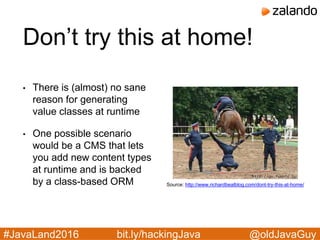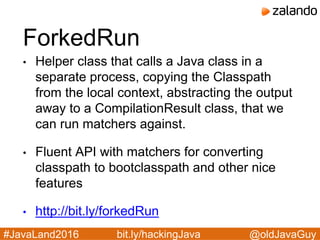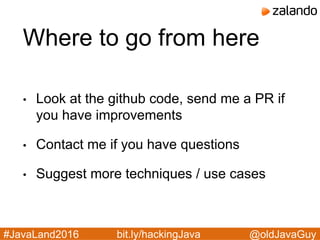Hacking Java @JavaLand2016
- 1. @oldJavaGuy#JavaLand2016 bit.ly/hackingJava Enhancing Code at build or runtime Sean Patrick Floyd Hacking Java
- 2. @oldJavaGuy#JavaLand2016 bit.ly/hackingJava Sean Patrick Floyd • Search Engineer @ Zalando • ~20 years experience • Java, Maven, Spring, Scala, Groovy • Twitter: @oldJavaGuy • StackOverflow: bit.ly/spfOnSO
- 3. @oldJavaGuy#JavaLand2016 bit.ly/hackingJava Scope of this talk • Overview of non-standard techniques • Grouped by use case • Some techniques are more mature than others • Code samples and unit tests
- 4. @oldJavaGuy#JavaLand2016 bit.ly/hackingJava Use Cases • Value Objects • Third party library patching • Compile-time code defect analysis
- 5. @oldJavaGuy#JavaLand2016 bit.ly/hackingJava Github Project • github.com/mostlymagic/hacking-java bit.ly/hackingJava • Organized as Multi-Module Maven project • Grouped by use case • Sample code and unit tests for every technique
- 6. @oldJavaGuy#JavaLand2016 bit.ly/hackingJava Use Case: Value Objects • Standard, well defined behavior (equals(), hashCode(), toString()) according to Effective Java • Mutable or immutable, with constructors, factory methods or builders • Java Boilerplate very verbose and error-prone
- 7. @oldJavaGuy#JavaLand2016 bit.ly/hackingJava The Pain public class MyValueObject { private final String property1; private final boolean property2; public MyValueObject(String property1, boolean property2) { this.property1 = property1; this.property2 = property2; } public String getProperty1() { return property1; } public boolean isProperty2() { return property2; } @Override public int hashCode() { return Objects.hash(property1, property2); } @Override public boolean equals(Object obj) { if (this == obj) { return true; } else if (obj instanceof MyValueObject) { MyValueObject other = (MyValueObject) obj; return Objects.equals(this.property1, other.property1) && Objects.equals(this.property2, other.property2); } else { return false; } } @Override public String toString() { return MoreObjects.toStringHelper(this) .add("property1", property1).add("property2", property2).toString(); } }
- 8. @oldJavaGuy#JavaLand2016 bit.ly/hackingJava For comparison: Scala case class MyValueObject(property1: String, property2: Boolean) {} Source: http://onlyinamericablogging.blogspot.com/2014/11/move-along-now-nothing-to-see-here.html
- 9. @oldJavaGuy#JavaLand2016 bit.ly/hackingJava Boilerplate • equals() / hashCode() / toString() / getters / setters / constructors / compareTo() • IDEs offer generation, but in a static way • potential bugs: adding or removing fields • Boilerplate (n.): newspaper [and IT] slang for "unit of writing that can be used over and over without change," 1893, from a literal meaning (1840) "metal rolled in large, flat plates for use in making steam boilers." Source: http://www.etymonline.com/ en.wikipedia.org/wiki/Boilerplate_(robot)
- 10. @oldJavaGuy#JavaLand2016 bit.ly/hackingJava Plan • Let’s look at technologies that let us define value objects in a less-verbose way • But with the full functionality (a test suite will monitor correct working of getters, equals, hashCode and toString) • Different approaches: build-time, compile- time, run-time
- 11. @oldJavaGuy#JavaLand2016 bit.ly/hackingJava Testing • Expected Data structure (mutable or immutable): User - firstName (String) - lastName (String) - birthDate (LocalDate) - addresses (List[Address]) Address - street (String) - zipCode (int) - city (String)
- 12. @oldJavaGuy#JavaLand2016 bit.ly/hackingJava Test suite for value objects public abstract class BaseUserTest { protected static final String FIRST_NAME = "Fred"; // etc. @Test public void equalsAndHashCodeAreSymmetrical() { Object user1 = createUser(); Object user2 = createUser(); assertThat(user1, is(equalTo(user2))); assertThat(user2, is(equalTo(user1))); assertThat(user1.hashCode(), is(equalTo(user2.hashCode()))); } @Test public void toStringIsConsistent() { assertThat(createUser().toString(), is(equalTo(createUser().toString()))); String s = createUser().toString(); assertThat(s, containsString(FIRST_NAME)); /* etc. */ } @Test public void compareToIsSymmetrical() { Object l = createUser(), r = createUser(); assertThat(l, instanceOf(Comparable.class)); assertThat(r, instanceOf(Comparable.class)); assertThat(((Comparable) l).compareTo(r), equalTo(((Comparable) r).compareTo(l))); } }
- 13. @oldJavaGuy#JavaLand2016 bit.ly/hackingJava Test suite (continued) @Test public void propertyMapHasCorrectValues() { Object instance = createUser(); Map<String, Object> map = getPropertyMap(instance); assertThat(map, hasEntry("firstName", FIRST_NAME)); // etc. } private static Map<String, Object> getPropertyMap(Object obj) { Map<String, Object> map = new TreeMap<>(); try { Arrays.stream(Introspector.getBeanInfo(obj.getClass(), Object.class) .getPropertyDescriptors()).filter((it) -> it.getReadMethod() != null) .forEach((pD) -> { Method m = propertyDescriptor.getReadMethod(); try { Object o = m.invoke(instance); map.put(pD.getName(), o); } catch (IllegalAccessException | ... e) { throw new ISE(e); }}); } catch (IntrospectionException e) { throw new IllegalStateException(e); } return propertyMap; } protected abstract Object createUser();
- 14. @oldJavaGuy#JavaLand2016 bit.ly/hackingJava Alternative Test Suite • Guava’s AbstractPackageSanityTests ( http://bit.ly/AbstractPackageSanityTests ) • Automatically runs sanity checks against top level classes in the same package of the test that extends AbstractPackageSanityTests. Currently sanity checks include NullPointerTester, EqualsTester and SerializableTester. • Nice, but not a perfect match for this use case
- 15. @oldJavaGuy#JavaLand2016 bit.ly/hackingJava Annotation Processing • JSR 269, pluggable annotation processing: Separate compiler lifecycle, well suited for code generation • Service auto-discovery through ServiceLoader: /META-INF/services/javax.annotation.processing.Processor contains qualified processor names ( bit.ly/srvcLdr ) • Docs: bit.ly/annotationProcessing (Oracle JavaDocs)
- 16. @oldJavaGuy#JavaLand2016 bit.ly/hackingJava Project Lombok • Name: Lombok is an Indonesian Island neighboring Java (“it’s not quite Java, but almost”) • Project Lombok uses Annotation Processing to extend the AST. It uses internal compiler APIs (Javac and Eclipse) • Advantages: Little code, lots of power, no runtime dependencies • Disadvantages: Relying on undocumented internal APIs, adds code that is not reflected in sources (inconsistent) Source: http://bit.ly/1lOfPbC
- 17. @oldJavaGuy#JavaLand2016 bit.ly/hackingJava Lombok: mutable example @Data public class MyValueObject { private String property1; private boolean property2; } • Generates getters, setters, equals, hashCode, toString • Additional fine-tuning annotations are available
- 18. @oldJavaGuy#JavaLand2016 bit.ly/hackingJava Lombok: immutable example @Data public class MyValueObject { private final String property1; private final boolean property2; } • Generates constructor, getters, equals, hashCode, toString • Builder version also available
- 19. @oldJavaGuy#JavaLand2016 bit.ly/hackingJava Google AutoValue • https://github.com/google/auto/tree/master/value • “AutoValue […] is actually a great tool for eliminating the drudgery of writing mundane value classes in Java. It encapsulates much of the advice in Effective Java […]. The resulting program is likely to be shorter, clearer, and freer of bugs.” -- Joshua Bloch, author, Effective Java • Advantages: Only public APIs used, no runtime dependencies • Disadvantages: Less power and flexibility, only immutable types supported (or is that an advantage?)
- 20. @oldJavaGuy#JavaLand2016 bit.ly/hackingJava AutoValue Sample code @AutoValue // class needs to be abstract public abstract class MyVO { // use JavaBeans property names // or simple field names public abstract String getProperty1(); public abstract boolean isProperty2(); // factory method for instantiation static MyVO create(String p1, boolean p2){ return new AutoValue_MyVO(p1, p2); //"AutoValue_" + abstract class name } }
- 21. @oldJavaGuy#JavaLand2016 bit.ly/hackingJava CGLib BeanGenerator • https://github.com/cglib/cglib • CGLib is a “high level” byte code manipulation framework • Widely used in production code, mostly by IOC and ORM frameworks (Spring, Guice etc) • BeanGenerator is a playground feature that can create value types on the fly • Works on Byte Code (Stack programming model): https://en.wikipedia.org/wiki/Java_bytecode
- 22. @oldJavaGuy#JavaLand2016 bit.ly/hackingJava Caveat • BeanGenerator generates field + getter + setter (no immutable types, no equals(), hashCode(), toString()) • To solve these issues, I am creating a dynamic proxy around the generated class, which in turn uses a full JavaBeans property map for all operations. • /* This is O(scary), but seems quick enough in practice. */ (Source: http://bit.ly/bigOScary ) • There is probably no sane use case for this
- 23. @oldJavaGuy#JavaLand2016 bit.ly/hackingJava Don’t try this at home! • There is (almost) no sane reason for generating value classes at runtime • One possible scenario would be a CMS that lets you add new content types at runtime and is backed by a class-based ORM Source: http://www.richardbealblog.com/dont-try-this-at-home/
- 24. @oldJavaGuy#JavaLand2016 bit.ly/hackingJava Code Generation • Techniques for creating source code dynamically at build time before compiling • For those of us who like to “write code that writes code” Source: http://xkcd.com/1629/ Source: http://www.memes.com/meme/487
- 25. @oldJavaGuy#JavaLand2016 bit.ly/hackingJava Why code generation? • Style wars: e.g. instanceof vs getClass() • Custom requirements: Serializable, Jackson or JPA annotations • Good news: you can do almost anything • Bad news: you have to do almost everything yourself • Most users will prefer “standard” solutions like Lombok or AutoValue
- 26. @oldJavaGuy#JavaLand2016 bit.ly/hackingJava Adding code generation to the Maven Build • Maven has two dedicated lifecycle phases for code generation, “generate-sources” and “generate-test- sources” • The easiest way to achieve code generation is to execute a Groovy script in one of these phases, using the Groovy Maven Plugin (http://bit.ly/groovyMavenPlugin ) • By convention, Code generation uses the output folder target/generated-sources/{generator-name} • Never generate code to src folder!
- 27. @oldJavaGuy#JavaLand2016 bit.ly/hackingJava JCodeModel • https://github.com/phax/jcodemodel • Fork of Sun’s abandoned JCodeModel project, which did code generation for JAXB • Programmatic Java AST generation and source code generation • Friendly, understandable API
- 28. @oldJavaGuy#JavaLand2016 bit.ly/hackingJava Code Generation with JCodeModel (in Groovy) class DtoGenerator { def codeModel = new JCodeModel() public generate(List<Dto> dtos, File targetDir) { dtos.each { def c = codeModel._package(it.packageName) ._class(JMod.PUBLIC, it.className) defineConstructor(c, it.properties) defineGetters(c, it.properties) defineEqualsMethod(c, it.properties) defineHashCodeMethod(c, it.properties) defineToStringMethod(c, it.properties) defineCompareToMethod(c, it.compProperties) } targetDir.mkdirs(); codeModel.build(targetDir) }}
- 29. @oldJavaGuy#JavaLand2016 bit.ly/hackingJava Constructor and Fields class DtoGenerator { // continued private defineConstructor(JDefinedClass c, Map fields) { def con = c.constructor(JMod.PUBLIC) def body = con.body() fields.each { e -> def type = resolveType(e.value) def f = c.field(PRIVATE | FINAL, type, e.key) def param = con.param(type, e.key) body.assign(THIS.ref(f), param) } } } // continued
- 30. @oldJavaGuy#JavaLand2016 bit.ly/hackingJava Value Objects (what else) • Techniques I haven’t explored yet, but might in future: • Template-based code generation • More efficient byte code generation (ByteBuddy) • Interface-based proxies • JEP 169 (http://openjdk.java.net/jeps/169)
- 31. @oldJavaGuy#JavaLand2016 bit.ly/hackingJava Use Case: Library Patching • Scenario: You have to use a third party library, which has known defects • Best choice: file an issue and / or submit a Pull Request to the library owner • I’ll assume this didn’t work, you are dependent on the library, but you don’t want to fork it, since you want to stay current • Techniques that will let you patch lib in an automated way (ideally in a CI / CD pipeline)
- 32. @oldJavaGuy#JavaLand2016 bit.ly/hackingJava Options • If you have access to the source code, use a source code parser and dynamically patch the sources • Otherwise, manipulate byte code (change or intercept existing code). Can be done statically at build time or dynamically at class load time • Create a static patch and write tests which make sure the patch worked (I won’t explore this option)
- 33. @oldJavaGuy#JavaLand2016 bit.ly/hackingJava Baseline • As example I have written a trivial example class, with some pretty stupid, but harmless bugs: public class FicticiousExample { public Integer yUNoReuseInteger(final int value) { System.setProperty(RAN_BUGGY_CODE, TRUE); return new Integer(value); } public String yUStringConcatInLoop(Iterable<String> data, String delim) { System.setProperty(RAN_BUGGY_CODE, TRUE); String v = ""; final Iterator<String> it = data.iterator(); if (it.hasNext()) { v += it.next(); } while (it.hasNext()) { v += delim + it.next(); } return value; } }
- 34. @oldJavaGuy#JavaLand2016 bit.ly/hackingJava Test suite • In the test, I call the methods and assert that they work correctly and that the system properties weren’t set public abstract class FicticiousExamplePatchTest { private FicticiousExample fe; @After public void checkForEvilSystemProperty() { assertNull(System.getProperty(RAN_BUGGY_CODE)); } @Before public void initObject() { fe = new FicticiousExample(); } @Test public void assertCorrectIntegerBehavior() { assertTrue(fe.yUNoReuseInteger(123) == fe.yUNoReuseInteger(123)); assertFalse(fe.yUNoReuseInteger(1234) == fe.yUNoReuseInteger(1234)); } @Test public void assertCorrectStringBehavior() { // etc.
- 35. @oldJavaGuy#JavaLand2016 bit.ly/hackingJava AspectJ • https://eclipse.org/aspectj/ • Aspect-oriented language (.aj format or Java with @AspectJ annotations) • ajc = AspectJ Compiler (after javac, instead of javac) • static compilation or load time weaving through agent • Docs are ancient / non-existent, use mailing list or read “the” book: bit.ly/ajInAction
- 36. @oldJavaGuy#JavaLand2016 bit.ly/hackingJava Patching Aspect public aspect FicticiousExamplePatch{ public pointcut integerMethodCalled(int value) : execution(* FE.yUNoReuseInteger(..)) && args(value); public pointcut stringMethodCalled(Iterable<String> it, String s): execution(* FE.yUStringConcatInLoop(..)) && args(it, s); Integer around(int i) : integerMethodCalled(i){ return Integer.valueOf(i); } String around(Iterable<String> it, String s) : stringMethodCalled(it, s){ java.util.Iterator<String> iterator = it.iterator(); StringBuilder sb = new StringBuilder(); if(iterator.hasNext()){ sb.append(iterator.next()); while(iterator.hasNext()){ sb.append(s).append(iterator.next()); } } return sb.toString(); } }
- 37. @oldJavaGuy#JavaLand2016 bit.ly/hackingJava AspectJ capabilities • Extending / replacing / enriching code • Inter-type declarations (~= Traits) • Policy Enforcement (define custom compiler errors) • Very flexible, can work on source or byte code • Standard usage: Cross-cutting concerns (security, logging etc.)
- 38. @oldJavaGuy#JavaLand2016 bit.ly/hackingJava Source Code Manipulation • Extract sources to generated-sources directory • Parse and manipulate the sources (non- idempotent!?) • Compile sources and distribute your library
- 39. @oldJavaGuy#JavaLand2016 bit.ly/hackingJava JavaParser • http://javaparser.github.io/javaparser/ • Parsers generated from JavaCC (Java Compiler Compiler) -> complete Java 1.8 grammar support • API not as friendly as JCodeModel (no management of types and references etc.), but the only available fully functional Java source code parser • Again, I’ll be using Groovy to do the actual work. It could be done in Java too, but the build setup would be more complex
- 40. @oldJavaGuy#JavaLand2016 bit.ly/hackingJava PatchVisitor class MyVisitor extends VoidVisitorAdapter<Void> { public void visit(MethodDeclaration n, Object arg) { if (n.name == "yUStringConcatInLoop") { n.body = new BlockStmt() // delete body patchStringMethod(n.body, n.parameters[0], n.parameters[1]) } else if (n.name == "yUNoReuseInteger") { n.body = new BlockStmt() // delete body patchIntegerMethod(n.body, n.parameters[0]) } else super.visit(n, arg) }
- 41. @oldJavaGuy#JavaLand2016 bit.ly/hackingJava PatchVisitor (Integer method) private patchIntegerMethod( BlockStmt b, Parameter p) { def t = new ClassOrInterfaceType("Integer"); def e = new TypeExpr(); e.type = t def mc = new MethodCallExpr(e, "valueOf") mc.args.add(new NameExpr(p.id.name)) b.getStmts().add(new ReturnStmt(mc)) } // all this for // return Integer.valueOf(i);
- 42. @oldJavaGuy#JavaLand2016 bit.ly/hackingJava Tradeoff • AST manipulation is hard, very verbose and error prone • But: It’s still better than trying to do it with Regex (insert obligatory Regex Cthulhu link here) • friendlier Alternative: walkmod.com (built on JavaParser, “walkmod is an open source tool to apply and share your own code conventions.”) Source: http://subgenius.wikia.com/wiki/Cthulhu
- 43. @oldJavaGuy#JavaLand2016 bit.ly/hackingJava Use Case: Defect Analysis • Identify bug patterns, reject them at compile time • Not mentioning the “good old” tools: CheckStyle, PMD, FindBugs. They are best used in a separate CI build • Focus on tools that hook directly into the compile process Source: http://sequart.org/magazine/59883/cult-classics-starship-troopers/
- 44. @oldJavaGuy#JavaLand2016 bit.ly/hackingJava Test Harness public abstract class AbstractDefectDetectionTest extends AbstractCompilerTest { private DefectAnalysisEngine engine; @Before public void setupEngine() { this.engine = instantiateEngine(); } @Test public void detectWellBehavedClass() { CompilationResult r = engine.compile(sourceFileFor(wellBehavedClass())); assertThat(r, isSuccess()); } @Test public void detectIllBehavedClass() { CompilationResult r = engine.compile(sourceFileFor(illBehavedClass())); assertThat(r, isFailureWithExpectedMessage(expectedErrorMessage())); } protected abstract DefectAnalysisEngine instantiateEngine(); protected abstract Class<? extends WellBehaved> wellBehavedClass(); protected abstract Class<? extends IllBehaved> illBehavedClass(); protected abstract String expectedErrorMessage(); }
- 45. @oldJavaGuy#JavaLand2016 bit.ly/hackingJava ForkedRun • Helper class that calls a Java class in a separate process, copying the Classpath from the local context, abstracting the output away to a CompilationResult class, that we can run matchers against. • Fluent API with matchers for converting classpath to bootclasspath and other nice features • http://bit.ly/forkedRun
- 46. @oldJavaGuy#JavaLand2016 bit.ly/hackingJava ForkedRun (sample) public final CompilationResult run() { final Set<String> classPath = new LinkedHashSet<>(); final Set<String> bootPath = new LinkedHashSet<>(); try { dispatchClassPath(classPathElements, bootPathElements); String javaExe = getExecutable(); List<String> cmds = buildCommands(classPath, bootPath, javaExe); ProcessBuilder pb = new ProcessBuilder().command(cmds); Process proc = pb.start(); List<String> errorMsg = gatherOutput(proc); int status = proc.waitFor(); return new CompilationResult(status == 0, errorMsg); } catch (InterruptedException | … | URISyntaxException e) { throw new IllegalStateException(e); } }
- 47. @oldJavaGuy#JavaLand2016 bit.ly/hackingJava False positives • Example: Immutability (impossible to reliably detect, by any technology known to me) public final class ImmutableUser{ private final String name; private final Date birthDate; private final List<String> nickNames; public ImmutableUser(String name, List<String> nickNames, Date birthDate) { this.name = name; this.nickNames = ImmutableList.copyOf(nickNames); this.birthDate = new Date(birthDate.getTime()); } public String getName() { return name; } public List<String> getNickNames() { return ImmutableList.copyOf(nickNames); } public Date getBirthDate() { return new Date(birthDate.getTime()); } }
- 48. @oldJavaGuy#JavaLand2016 bit.ly/hackingJava What can we detect? • Forbidden classes, erroneous usages • Package-level architecture restrictions (MicroServices or OSGI are a better solution) • Implementation inconsistent with annotations or interface (e.g. Nullness)
- 49. @oldJavaGuy#JavaLand2016 bit.ly/hackingJava Google Error Prone • http://errorprone.info/ • Google 20% project • Wrapper around javac, with compatible API • Many defined bug-patterns, most specific to Google (Android, Protobuf, Gwt, Guice) • New Bug Patterns can only be added via Pull Request to Google :-( • Integrated with Maven, Gradle, Ant etc.
- 50. @oldJavaGuy#JavaLand2016 bit.ly/hackingJava Obscure bug patterns • Example: Regex bug detection public class IllBehavedRegex { static List<String> splitByAlpha(String s) { return Arrays.asList( s.split("[a-z")); // bad pattern } }
- 51. @oldJavaGuy#JavaLand2016 bit.ly/hackingJava Checker Framework • http://types.cs.washington.edu/checker-framework/ • The Checker Framework enhances Java’s type system to make it more powerful and useful. This lets software developers detect and prevent errors in their Java programs. The Checker Framework includes compiler plug- ins ("checkers") that find bugs or verify their absence. It also permits you to write your own compiler plug-ins. • Disadvantage: needs to be installed separately, hard to integrate in a build system • But: checkers can be used as plain annotation processors
- 52. @oldJavaGuy#JavaLand2016 bit.ly/hackingJava Java 8 Type Annotations • As of the Java SE 8 release, annotations can also be applied to any type use […] A few examples of where types are used are class instance creation expressions (new), casts, implements clauses, and throws clauses. http://bit.ly/typeAnnotations • The Checker Framework embraces these new annotation usages Source: http://memegenerator.net/
- 53. @oldJavaGuy#JavaLand2016 bit.ly/hackingJava Example: Nullness public class WellbehavedNullness { @PolyNull String nullInOut(@PolyNull String s) { if (s == null) return s; return s.toUpperCase().trim(); } @MonotonicNonNull private String initallyNull; public void assignField(@NonNull String value) { initallyNull = checkNotNull(value); } @Nonnull public String getValue() { if (initallyNull == null) initallyNull = "wasNull"; return initallyNull; } } Source: https://imgflip.com/memegenerator
- 54. @oldJavaGuy#JavaLand2016 bit.ly/hackingJava AspectJ (again) • AspectJ allows custom compiler errors, according to static checks • Architecture checks: package a may not access package b • Forbidden usage patterns: e.g. Spring MVC controller may not take OutputStream param • Forbidden classes: Enforce deprecation of legacy classes • Most of these problems can be solved differently (MicroServices etc.) Source: http://www.someecards.com/usercards/viewcard/MjAxMy1jZWRhODllNTI3YWI4Yjkz
- 55. @oldJavaGuy#JavaLand2016 bit.ly/hackingJava Forbid usage of deprecated types public aspect PolicyEnforcementAspect{ pointcut badCall() : call(* Hashtable.*(..)) || call(Hashtable.new(..)) || call(* Vector.*(..)) || call(Vector.new(..)); declare error : badCall() "Hashtable and Vector are deprecated!"; }
- 56. @oldJavaGuy#JavaLand2016 bit.ly/hackingJava Overview of discussed techniques • Obviously, this is an opinion, not advice. Use at your own risk. • Author is not affiliated with any of the above libraries. Technique Have I used in real applications? Do I recommend technique? Lombok yes maybe AutoValue yes yes CGLib BeanGenerator no no JCodeModel yes yes AspectJ (patching) yes maybe JavaParser yes maybe ErrorProne no maybe Checker Framework no yes AspectJ (policy enforcement) yes yes
- 57. @oldJavaGuy#JavaLand2016 bit.ly/hackingJava Where to go from here • Look at the github code, send me a PR if you have improvements • Contact me if you have questions • Suggest more techniques / use cases
Editor's Notes
- #4: No Buzzwords No MicroServices, Docker, Reactive Programming
- #24: reference to ByteBuddy
- #35: Code against original type
- #37: Pointcut vs advice
- #40: ANTLR
- #41: delete body method not available
- #43: reference: custom Maven version
- #45: Github code setup not recommended setup
- #47: Classpath vs BootClassPath
- #52: Annotation Processing
- #59: Ask me about working for Zalando









![@oldJavaGuy#JavaLand2016 bit.ly/hackingJava
Boilerplate
• equals() / hashCode() / toString() /
getters / setters / constructors /
compareTo()
• IDEs offer generation, but in a static
way
• potential bugs: adding or removing
fields
• Boilerplate (n.): newspaper [and IT]
slang for "unit of writing that can be
used over and over without change,"
1893, from a literal meaning (1840)
"metal rolled in large, flat plates for
use in making steam boilers."
Source: http://www.etymonline.com/
en.wikipedia.org/wiki/Boilerplate_(robot)](https://image.slidesharecdn.com/hackingjavaland-160309171218/85/Hacking-Java-JavaLand2016-9-320.jpg)

![@oldJavaGuy#JavaLand2016 bit.ly/hackingJava
Testing
• Expected Data structure (mutable or
immutable):
User
- firstName (String)
- lastName (String)
- birthDate (LocalDate)
- addresses (List[Address])
Address
- street (String)
- zipCode (int)
- city (String)](https://image.slidesharecdn.com/hackingjavaland-160309171218/85/Hacking-Java-JavaLand2016-11-320.jpg)







![@oldJavaGuy#JavaLand2016 bit.ly/hackingJava
Google AutoValue
• https://github.com/google/auto/tree/master/value
• “AutoValue […] is actually a great tool for eliminating the
drudgery of writing mundane value classes in Java. It
encapsulates much of the advice in Effective Java […].
The resulting program is likely to be shorter, clearer, and
freer of bugs.” -- Joshua Bloch, author, Effective Java
• Advantages: Only public APIs used, no runtime
dependencies
• Disadvantages: Less power and flexibility, only
immutable types supported (or is that an advantage?)](https://image.slidesharecdn.com/hackingjavaland-160309171218/85/Hacking-Java-JavaLand2016-19-320.jpg)




















![@oldJavaGuy#JavaLand2016 bit.ly/hackingJava
PatchVisitor
class MyVisitor extends VoidVisitorAdapter<Void> {
public void visit(MethodDeclaration n,
Object arg) {
if (n.name == "yUStringConcatInLoop") {
n.body = new BlockStmt() // delete body
patchStringMethod(n.body, n.parameters[0],
n.parameters[1])
} else if (n.name == "yUNoReuseInteger") {
n.body = new BlockStmt() // delete body
patchIntegerMethod(n.body, n.parameters[0])
} else super.visit(n, arg) }](https://image.slidesharecdn.com/hackingjavaland-160309171218/85/Hacking-Java-JavaLand2016-40-320.jpg)











![@oldJavaGuy#JavaLand2016 bit.ly/hackingJava
Java 8 Type Annotations
• As of the Java SE 8
release, annotations can
also be applied to any type
use […] A few examples of
where types are used are
class instance creation
expressions (new), casts,
implements clauses, and
throws clauses.
http://bit.ly/typeAnnotations
• The Checker Framework
embraces these new
annotation usages
Source: http://memegenerator.net/](https://image.slidesharecdn.com/hackingjavaland-160309171218/85/Hacking-Java-JavaLand2016-52-320.jpg)







